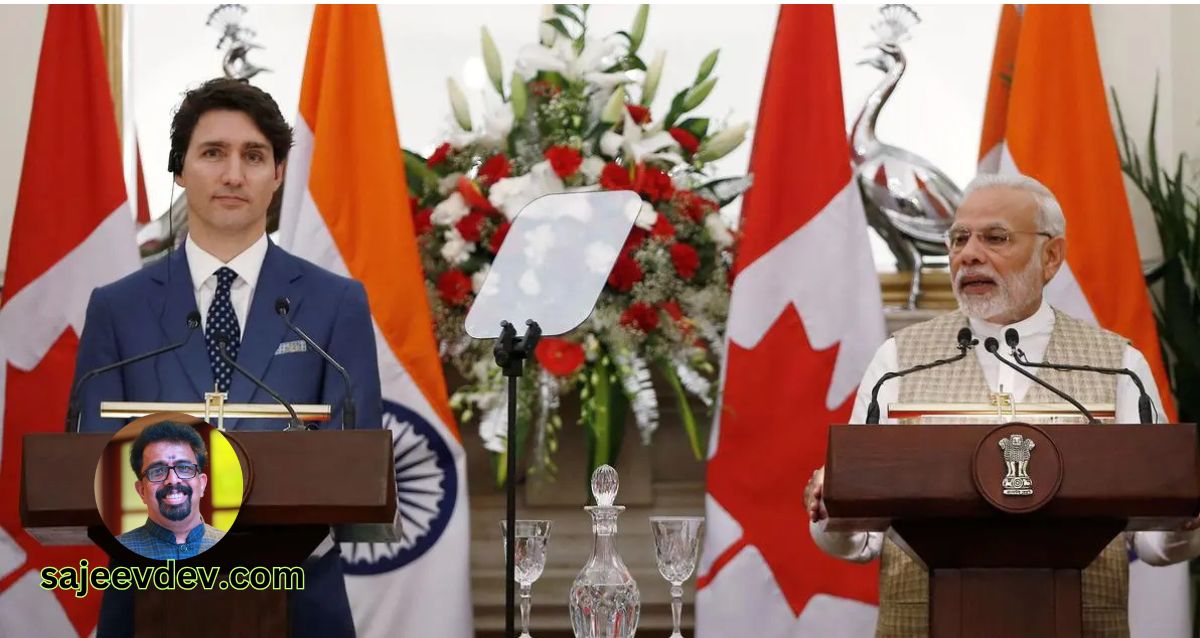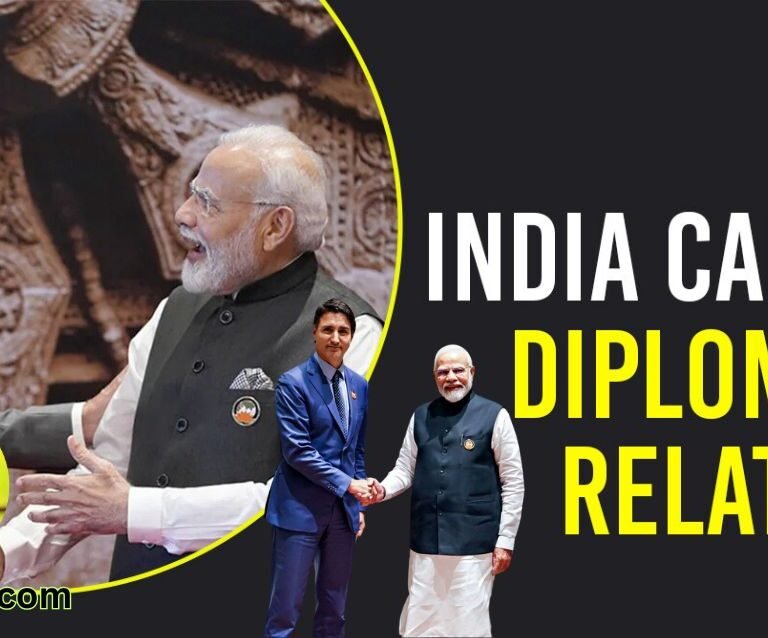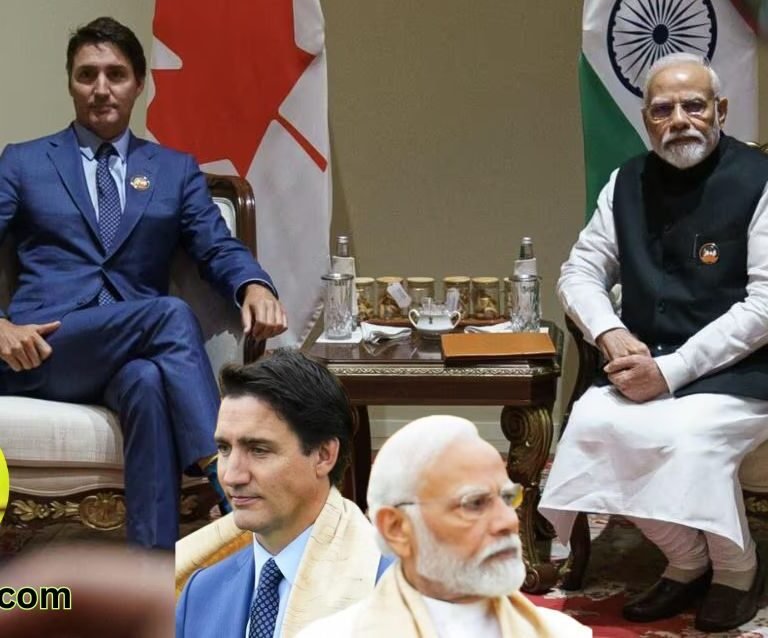The diplomatic relations between India and Canada have witnessed a significant deterioration in recent months, primarily due to a series of complex events that have escalated into a major crisis
The diplomatic relations between India and Canada have witnessed a significant deterioration in recent months, primarily due to a series of complex events that have escalated into a major crisis. Historically, the two nations have enjoyed a cooperative relationship, characterized by shared values, economic ties, and a vibrant Indian diaspora in Canada. However, recent events have strained this bond, leading to increased tensions on various fronts.
The situation took a pivotal turn following the assassination of Hardeep Singh Nijjar, a prominent Sikh leader in Canada, which has been linked to allegations of involvement by Indian state actors. This incident has heightened security concerns and fears of political interference, setting off a chain reaction of accusations and counter-accusations between the two countries. Canada’s Prime Minister, Justin Trudeau, publicly addressed these allegations in the Canadian Parliament, stating that there were credible reports implicating the Indian government, which has resulted in a diplomatic backlash.
In response, India has strongly refuted these allegations, asserting that they lack substantive evidence and have been driven by anti-India sentiments prevalent in certain political groups within Canada. Consequently, these developments have precipitated a series of diplomatic actions, including the expulsion of diplomats, travel advisories, and heightened scrutiny of bilateral engagements. Various international observers have voiced concerns regarding the implications of this strained relationship, particularly given the broader geopolitical landscape in which both countries operate.
The ongoing crisis not only represents a fracture in diplomatic relations but also reflects the complexities of global politics and the intertwined historical narratives that influence contemporary interactions. As the situation evolves, it raises critical questions about the future of India-Canada relations and the potential for reconciliation amidst escalating tensions.
Background: Hardeep Singh Nijjar and His Significance
Hardeep Singh Nijjar was a notable Sikh leader based in Canada, widely recognized for his commitment to advocating for the rights of the Sikh community both domestically and internationally. Born in India, he emigrated to Canada, where he became increasingly involved in activism related to Sikh issues, including the recognition of the 1984 anti-Sikh riots. His efforts to mobilize the Sikh diaspora were pivotal in raising awareness about matters that affect the community, including issues of identity, minority rights, and political representation. Nijjar’s activism was marked by his ability to forge alliances with other marginalized groups, underscoring his importance as a unifying figure within the wider Sikh community.
His role as the president of the Guru Nanak Sikh Gurdwara in Surrey, British Columbia, further amplified his influence, allowing him to address not only local concerns but also broader geopolitical issues impacting Sikhs globally. Nijjar’s advocacy extended to organizing community events and regional discussions that focused on the Punjab region and its socio-political landscape. This outspokenness inevitably began to shape perceptions of India-Canada relations, as his criticisms often examined and challenged the Indian government’s policies toward Sikhs.
The circumstances surrounding his death in June 2023 have intensified these existing tensions, as many in the Sikh community view him as a martyr for their cause. The reaction from both Sikh leaders and the Canadian government highlights the complexities surrounding Nijjar’s legacy and its implications for Canada-India diplomatic relations. His tragic demise has brought long-standing grievances to the forefront, further complicating interactions between these two nations that were already fraught with challenges. Thus, understanding Hardeep Singh Nijjar’s life and activism is essential in comprehending the current diplomatic crisis between India and Canada.
The Accusations: Trudeau’s Claims and Their Impact
In a significant diplomatic escalation, Canadian Prime Minister Justin Trudeau stated that the Indian government may have played a role in the extraterritorial killing of Hardeep Singh Nijjar, a prominent Sikh separatist leader, in British Columbia. This shocking allegation comes amidst deepening tensions in the already strained relations between India and Canada. Trudeau’s claims were made public during an address to the Canadian Parliament, marking a pivotal moment in bilateral ties. He cited credible intelligence that prompted Canada to take the issue seriously, thereby elevating it to the forefront of international discourse.
The fallout from these accusations has been immediate and pronounced. India, through its Ministry of External Affairs, has categorically rejected the allegations, labeling them as “absurd” and “motivated” by factors beyond bilateral relations. Officials in New Delhi have expressed firm opposition to what they perceive as baseless claims aimed at undermining India’s sovereignty. This situation has led to a significant diplomatic crisis, with both nations expelling each other’s diplomats, reflecting the heightened animosity.
The implications of Trudeau’s statements extend beyond mere rhetoric. In Canada, they resonate within the context of domestic politics, where the Sikh community is a notable constituency, advocating for greater rights and recognition. In India, the accusations have raised concerns over national security and the potential for increasing anti-India sentiment among diaspora populations. Furthermore, the geopolitical ramifications can be substantial, potentially influencing trade and cooperation on broader international issues such as climate change and security.
The ongoing crisis serves as a stark reminder of the complexities involved in international relations, where statements by political leaders can have far-reaching consequences. The evolving narrative continues to garner global attention, with many watching closely to see how both governments will navigate this diplomatic impasse.
Responses from India: Officials and Government Reactions
In recent months, the diplomatic tensions between India and Canada have escalated significantly, prompting a robust response from Indian officials and government leaders. The Indian government has categorically refuted the allegations levied against it by Canadian authorities, labeling them as baseless and politically motivated. Such assertions have not only strained bilateral relations but have also raised concerns over national security and the safety of Indian citizens abroad.
Indian diplomats have taken a proactive stance in addressing the situation. In multiple press conferences and official statements, they emphasized that India remains committed to ensuring its sovereignty and security, dismissing claims about any involvement in covert operations on Canadian soil. The Ministry of External Affairs has reiterated the importance of credible evidence before making accusations, underlining that India will not tolerate any infringement upon its integrity.
This ongoing crisis has prompted India to reassess its security measures, particularly regarding its diplomatic missions and expatriates in Canada. Increased vigilance and protective protocols have been put in place to safeguard Indian nationals, reflecting the government’s dedication to the welfare of its citizens during these tumultuous times. Furthermore, India has engaged in dialogue with various international bodies, aiming to garner support and communicate its stance on the matter effectively.
In light of these developments, the broader implications for India’s international relations are noteworthy. India’s refutation of Canadian allegations and its corresponding security enhancements signal a shift in its diplomatic posture. This situation necessitates careful navigation, as the government seeks to maintain positive relations with other nations while firmly defending its national interests. Overall, the Indian government’s responses illustrate a firm commitment to transparency and resilience in the face of international scrutiny.
Diplomatic Fallout: Expulsions and Trade Talks
The diplomatic tensions between India and Canada have recently escalated, leading to significant measures that reflect the gravity of the situation. Following accusations made by Canadian Prime Minister Justin Trudeau regarding the involvement of Indian agents in the assassination of a Canadian citizen, both countries have opted for reciprocal expulsion of diplomats. This action not only demonstrates the depth of animosity that has developed but also marks a critical point in bilateral relations that have historically fluctuated between cooperation and conflict.
The expulsions are a direct response to the heightened allegations and serve as a severe diplomatic rebuke. Each nation has signaled its intent to protect its sovereignty while also sending a message to the international community regarding their respective stances. Such dramatic shifts often carry far-reaching consequences, not only impacting diplomatic engagements but also triggering wider economic repercussions.
In the wake of these events, trade negotiations between India and Canada have come to a standstill. The countries had been in discussions aimed at strengthening their economic ties, but the current climate of distrust has led to a halt in cooperative efforts. This pause in trade talks is particularly concerning given the potential benefits that both economies could have reaped from a strengthened trade agreement. With Canada being a key partner in sectors such as technology and agriculture, and India looking to diversify its economic partnerships, the ramifications of this diplomatic fallout could hinder the prospects of future growth for both nations.
The long-term implications of these actions remain uncertain. However, it is evident that the deteriorating relationship could lead to a strategic realignment in regional alliances and economic partnerships. Both countries will need to reassess their diplomatic strategies to navigate the complexities arising from this crisis, ensuring that future discussions, if they occur, can take place in a more constructive atmosphere.
Public Sentiment: Canadian and Indian Perspectives
The ongoing diplomatic tensions between India and Canada are widely reflected in the sentiments of their respective populations. In Canada, many citizens, particularly within the Sikh diaspora, have expressed a range of emotions regarding the crisis. Some members of the Sikh community have rallied in support of India’s independence and autonomy, while others have criticized the Indian government’s stance, suggesting that it undermines human rights and community safety. This division illustrates the complex identities that exist within Canadian society, where multiculturalism and historical grievances play significant roles in attitudes towards international issues.
In contrast, public opinion in India predominantly views the diplomatic rift through a nationalistic lens. Many citizens have perceived Canada’s actions as a betrayal, prompting a surge of support for the Indian government’s stance. The media coverage in India has largely echoed this sentiment, emphasizing narratives of sovereignty and security. Indian news outlets frequently highlight the potential risks of Canadian policies that are seen to favor separatist movements, particularly those linked to the Sikh community. This has fostered an environment where patriotic sentiments are amplified, and dissent against external criticism is often met with significant backlash.
Community groups on both sides have also played vital roles in shaping public sentiment. In Canada, organizations advocating for the rights of Sikhs have protested against perceived injustices, thus influencing public discourse. Conversely, in India, pro-government groups have utilized social media platforms to galvanize support for their government’s actions and to discredit Canadian calls for dialogue or reform. These dynamics contribute to a polarized atmosphere where opinions are often starkly divided, reflecting the broader implications of the diplomatic crisis. The responses of the Canadian and Indian communities encapsulate the complexities of international relations, characterized by both solidarity and division.
International Implications: Global Reactions and Responses
The ongoing diplomatic tensions between India and Canada have drawn significant attention from various international actors, shaping the discourse surrounding sovereignty and extraterritorial actions. Countries, particularly those with vested interests in South Asia, have expressed varied reactions to the crisis. Some nations have called for restraint while underscoring the importance of dialogue and diplomacy to resolve such conflicts peacefully. The response of prominent Western nations, notably the United States and the European Union, has emphasized adherence to international norms and the necessity of respecting sovereign rights. These statements reflect a broader concern regarding the impact of unilateral actions on diplomatic relations and global stability.
In addition, organizations such as the United Nations have been monitoring the situation closely, highlighting the need for a multilateral approach to address the underlying issues. The tensions have prompted discussions on how nations should navigate complex geopolitical landscapes without resorting to accusations of extraterritoriality. The realities of global interdependence are becoming increasingly evident, as countries weigh the risks of deteriorating diplomatic ties against the potential ramifications for trade relations and international security. For instance, the economic implications could be profound, with trade routes and partnerships hanging in the balance as nations reassess their diplomatic stances.
Moreover, the dynamics surrounding the India-Canada situation may influence other regions experiencing similar conflicts. As a case study, it underscores the precarious nature of international relations in an increasingly polarized world. Increased scrutiny on allegations of external meddling may encourage nations to adopt more cautious strategies, influenced by global public opinion and diplomatic norms. Ultimately, the unfolding crisis illustrates the intricate web of international diplomacy, where national interests must be balanced with collective responsibility, highlighting the crucial role of dialogue in addressing global tensions.
Future Prospects: Potential Resolutions and Path Forward
The ongoing diplomatic tensions between India and Canada have raised significant concerns regarding the future relationship between the two nations. As both countries navigate this challenging crisis, exploring potential resolutions becomes imperative. Diplomatic negotiations can serve as a productive avenue to address underlying issues and restore trust. Both governments must engage in constructive dialogue, allowing for a platform where grievances can be addressed openly and respectfully, facilitating a better understanding of each other’s perspectives.
International mediators may also play a vital role in this context. Neutral parties can provide frameworks for negotiations, ensuring that discussions remain focused and fruitful. Engaging with organizations such as the United Nations or other diplomatic entities could facilitate a conducive environment for dialogue. These mediators can help bridge the gap by offering insights and recommendations based on successful conflict resolution practices. By involving a third party, both India and Canada can move past entrenched positions and work collaboratively toward viable solutions.
Moreover, rebuilding trust hinges on the commitment to ongoing dialogue. Both nations must recognize the importance of sustained communication, not only to prevent potential escalations but also to foster a cooperative atmosphere. This dialogue could manifest through bilateral meetings, cultural exchanges, and joint initiatives, enhancing mutual respect and understanding. If tensions decrease, it may pave the way for improved economic relations, trade partnerships, and diplomatic solidarity. Conversely, continued escalations could further alienate both nations on the global stage, with repercussions that may extend beyond diplomatic relations into economic and social realms.
In conclusion, the path forward for India and Canada lies in their ability to engage in meaningful negotiations, utilize international mediation, and embrace communication as a tool for rebuilding trust, with considerations for potential outcomes tied to their actions in the coming months.
In the analysis of the ongoing diplomatic tensions between India and Canada, several critical points have emerged that underscore the importance of effective diplomacy in addressing international conflicts
In the analysis of the ongoing diplomatic tensions between India and Canada, several critical points have emerged that underscore the importance of effective diplomacy in addressing international conflicts. The deterioration of relations, primarily triggered by contentious allegations and the subsequent political fallout, highlights the fragility inherent in diplomatic ties. Such incidents not only affect the two nations involved but also reverberate across the global diplomatic landscape, influencing alliances and international perceptions.
One key aspect of resolving these tensions lies in the recognition of the importance of constructive dialogue. Open and respectful communication can help bridge the gaps created by misunderstandings and misinterpretations. In the India-Canada case, fostering a platform for dialogue that transcends political agendas may aid in alleviating the current crisis. This approach not only focuses on the immediate issues at hand but also contributes to the long-term stability and trust necessary for peaceful coexistence.
Moreover, it is crucial to acknowledge the role of mutual respect in these interactions. Both nations possess rich cultural histories and distinct identities that should be acknowledged and valued. Enhancing bilateral relations by recognizing each other’s perspectives fosters a more positive environment for negotiations. This respect can act as the foundation upon which tensions are resolved. Building a shared vision for coexistence is paramount for both nations moving forward.
In summary, the India-Canada situation serves as a poignant reminder of the vital role that diplomacy plays in resolving conflicts. As global dynamics continue to evolve, it is essential for countries to prioritize constructive engagement over discord. By investing in dialogue and fostering mutual respect, nations can navigate and mitigate future crises, ensuring a more cooperative international community.









